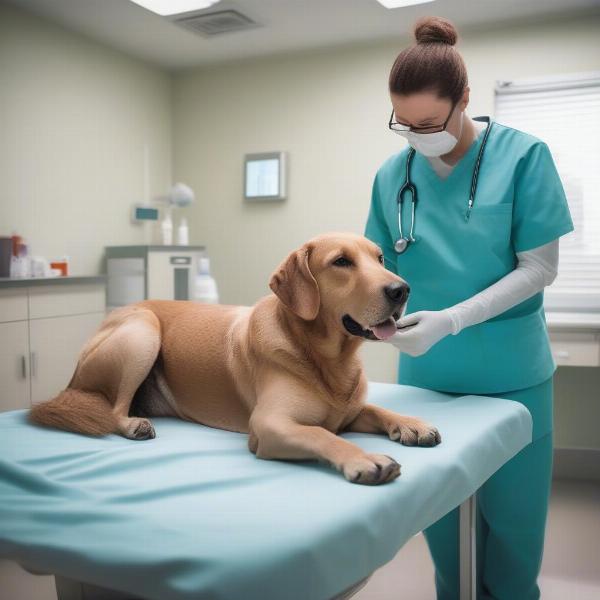The 9 way shot for dogs, often mistakenly referred to as a “vaccine,” is actually a combination of essential nutrients and medications administered to treat a range of common canine ailments. This guide will delve into the components of the 9 way shot, its uses, benefits, and potential side effects, equipping you with the knowledge to make informed decisions about your dog’s health.
Understanding the 9 Way Shot’s Components
The 9 way shot isn’t a single vaccine but a tailored mixture typically including antibiotics, vitamins, and fluids. Its composition can vary depending on the dog’s specific needs and the veterinarian’s assessment. Commonly included components target distemper, hepatitis, leptospirosis, parainfluenza, and parvovirus. It’s crucial to understand that the 9 way shot is a treatment, not a preventative measure like a vaccine.
When is the 9 Way Shot Administered?
The 9 way shot is administered to dogs exhibiting symptoms of illness, such as vomiting, diarrhea, lethargy, or respiratory distress. It’s particularly useful in situations where immediate veterinary care isn’t accessible, providing temporary relief until professional help can be sought. However, it’s crucial to remember that it’s not a substitute for proper veterinary diagnosis and treatment.
Benefits of the 9 Way Shot
The primary benefit of the 9 way shot is its ability to provide rapid relief from a range of symptoms. The combination of medications and nutrients can help boost the dog’s immune system, combat infection, and alleviate discomfort. It can be a life-saver in emergency situations, especially for dogs in remote areas with limited access to veterinary clinics.
Potential Side Effects and Precautions
While generally safe, the 9 way shot can have potential side effects, including pain at the injection site, allergic reactions, and digestive upset. It’s crucial to consult with a veterinarian before administering the shot, especially if your dog has a history of allergies or other medical conditions. Never self-administer the 9 way shot without professional guidance. Incorrect dosage or administration can be harmful. Remember, a proper diagnosis from a veterinarian is essential.
Addressing Common Misconceptions
One common misconception is that the 9 way shot is a vaccine. It is not. Vaccines are preventative measures that stimulate the immune system to develop immunity against specific diseases. The 9 way shot, on the other hand, is a treatment for existing illness. Another misconception is that it’s a cure-all. While it can provide relief, it doesn’t address the underlying cause of the illness.
 Dog Receiving Veterinary Care: A dog being examined by a veterinarian.
Dog Receiving Veterinary Care: A dog being examined by a veterinarian.
Conclusion
The 9 way shot can be a valuable tool in managing canine illness, particularly in emergency situations. However, it’s essential to use it responsibly and under the guidance of a veterinarian. It is not a substitute for professional veterinary care and should not be considered a preventative measure. Always prioritize a proper diagnosis and treatment plan from a qualified veterinarian to ensure your dog’s health and well-being.
FAQs
- Is the 9 way shot a vaccine? No, it is a treatment for existing illness, not a preventative measure.
- Can I administer the 9 way shot myself? No, always consult a veterinarian before administering any medication to your dog.
- What are the potential side effects? Possible side effects include pain at the injection site, allergic reactions, and digestive upset.
- Is the 9 way shot a cure-all? No, while it provides relief, it doesn’t address the underlying cause of the illness.
- When should I seek veterinary care? If your dog is showing any signs of illness, consult a veterinarian immediately.
- What should I do if my dog has an adverse reaction to the shot? Contact your veterinarian immediately.
- Is the 9 way shot appropriate for all dogs? No, a veterinarian will determine if it’s appropriate based on the dog’s condition and medical history.
About ILM Dog
ILM Dog is your trusted international resource for expert advice on dog breeds, health, training, nutrition, grooming, and much more. We provide comprehensive, practical information for dog owners of all experience levels, helping you navigate every aspect of dog care. From puppyhood to senior care, we cover it all. For expert advice tailored to your dog’s specific needs, contact us today! Email: [email protected], Phone: +44 20-3965-8624. Visit ILM Dog for more valuable resources and to enhance your dog’s life.